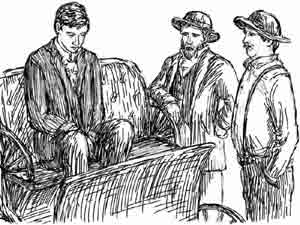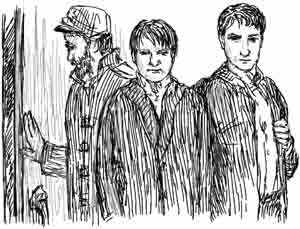Abridged from The Pilot’s Voice
The Pilot’s Voice: Part 3
It had been the most wildly strange and exciting night of Byron’s life, but his heart is not peaceful or happy. How can he escape the overhanging cloud that someone will find out?
As Byron rode home from Sunday school with his mother that day, he tried hard to forget his cruel words to her and what had followed. But his mind continued to be troubled. In every way his mother was a wonder to him. He had never known her to be so kind, yet he never got the courage to tell her what had happened. Thus the week slipped away, and Sunday morning came again.
When they entered the chapel, Byron was surprised to see that James was not there. After sitting through Sunday school, he went outside and sat alone in a buggy. He heard the singing begin, but he did not care to go inside. Why had the others not come? Could it be that something had happened?
Byron started nervously as a covered buggy turned into the churchyard. With sudden fear, he saw two men alight and turn in his direction. Byron knew them both, for one was the Farmer Davis in whose orchard they had been only last week. They greeted him warmly, but his guilty conscience made him very uneasy and he could not look them in the face.

“Where were you, Byron,” Mr. Davis asked, after a long silence, “on Saturday night, one week ago?” Byron face flushed and then paled as he felt their eyes boring right through him.
“I was with James at his house,” he managed to say.
“Don’t hide it,” Mr. Davis said. “From your face I can tell that you are guilty, and the best thing for you to do is to acknowledge it and take your medicine.” Byron could not speak for the suffocating feeling that filled him.
Mr. Davis continued, “We know the facts of the case and have tracked you boys down, so tell the truth. We will stand by you if you do, as we believe you have gotten into this trouble from the bad influence of others.”
Byron could stand no more, and with quivering lips told the whole story. “But, oh!” he pleaded, “please do not tell my poor mother, for it would break her heart.” The men were kind, but they explained that this serious offense could not be hid, and they were going after the other boys. In bewilderment, Byron watched them drive off.
When the church service ended, Byron gladly made an escape to his cousin’s for the afternoon. How could he ever tell his mother? But one glance at her pale, sorrowful face when he returned home told him that she knew it all. In one bound the wayward boy was in his mother’s arms.
“Can you forgive me?” Byron cried, his wounded heart throbbing. “Oh, say that you can!”
“O my boy!” she moaned after he had told her the long sad story. “You cannot know how I have suffered over this. But God’s Spirit has surely been talking to you, in answer to my prayers. He wants to save you from your sinful ways and deliver your soul from all guilt that Jesus may come into your heart.”
“I do so want to be freed from this all, but this is such a mess I have to face.” In the gathering gloom Byron buried his face in his hands.
“Yes, dear,” Mother said quietly, “Mr. Davis said that as soon as he could locate the other boys an officer of the law would come to arrest you. Why don’t you come in for something to eat before bed?”
In the dark of his room that night Byron could only wonder why he had not heeded the warnings sooner. “O God!” he cried from the agony of his heart, “what shall I—what can I—do?”
A knock and footsteps sounded up the stairs. In tears Byron’s mother squeezed him and whispered, “One thing I must ask you before you must go, my boy: when you are put upon the witness stand, be truthful.” Then Byron was standing in the kitchen once more, an officer before him.
The man produced a paper and when the charges had been read he declared, “Byron, you are now under arrest.”
The weighty words fell like blows upon the boy. Byron looked at the stricken face of his broken-hearted mother, and almost despaired. God alone could get him out now.
It was with a tearful farewell that Byron left for the court house with his brother early the next morning. The picture was forever imprinted in his mind: Mother, so loving and sad, standing at the same little gate where she had plead with him only one week before. How could he forget?
They reached the squire’s house when it was still dark, and were quietly admitted in. Nervously Byron sat in the stillness thinking of home and all it meant to him. How long before he could return? A stomping at the door arrested his attention, and he looked up to see the officer once more. And James and George were with him.

In a glance Byron could see their disdain and scorn of him, they who had promised to stand by no matter what came. He remembered the vision of the gambling party in the store yard as a haunting memory. It surely had not paid to walk the way of deceit.
After a long anxious wait the trial was commenced. Byron was called up first and answered the questions as truthfully as he could. He could scarcely be calm in the presence of men he had known so well, and he recalled again the miller’s story. Why hadn’t he listened before the return was so difficult? He was indeed sorry now.
When the other boys were called forward, they denied all Byron had told. But their stories were so contradictory, that the officers were soon satisfied of the truth. The prosecutor then stood and gave the boys sound advice and admonishment, that they ought to abide by the laws if they would escape punishment.
“Now,” he continued, opening the law book, “your penalty for this violation includes a fine and prison sentence.” Byron gasped and felt the color drain from his face. How could he face it and what hope did he have to live this down? Relief flooded him when the officer arose and addressed them thus:
“James and George will take the full punishment for committing the crime and trying to shield themselves. But with Byron we will make a difference, since he has been truthful and sorry for the wrong he has been led into. When he has paid the fine he can return to his home and mother.”
How truly different Byron felt leaving that court and the old evil companionships behind. He desired only a pure and upright life and for the happiness and satisfaction that it would bring. After a long silent journey, he was glad to see home once more.
How changed and beautiful it all seemed! Mother’s face shone with a sweet glad smile, though still deeply lined with grief. She gladly received him and had to hear at once all about the trial and the favor he had been shown. “Oh, I knew that you were praying for me,” Byron said.
“Do you not believe that Jesus, at this very moment, is holding out the life-line to you?” she asked very earnestly. “He has paid the penalty for sin and wants to take yours.”
“Yes, Mother, with all my heart I believe, but the way is like mountains before me,” Byron answered.
“There is only one way to enter heaven, but the Christian life is not a hard one, for the Holy Spirit is sent for our Guide and helper,” Mother said. She brought out her Bible and talked a long while with Byron about the Lord’s dealings and call to the needy, thirsty soul. “And He is so eager for you to come,” she said.
After the brothers had eaten, Byron slipped off to his room. In weariness the reproaches whirled about him, until, at last, sleep came to his relief. He awoke rested enough to spend a few hours in the fields before supper.
Working in the same field where he had once hid the bean seeds, Byron remembered his mother’s faithful dealings. He could see that the same deceit of childhood had continued to grow until it had brought him into his present trouble. How carefully Mother had worked to teach him, but in the end he had rejected it all. It was only now that he saw the advantage of the pure life that could be his.
The next day the newspaper was brought in and Byron picked it up with trepidation. Yes, there was the whole story. Their arrest, their crimes, and their trial—all had been given to the public. He felt that with this thing hanging over him he was disgraced forever.
As the stolen tenth had grown and become troublesome to the miller, just so the results from the stealing of the eggs had increased on Byron’s hands. The wrong to his mother had spread to others. Kindly his mother helped him work to make things right with Mr. Davis and the others, but some battles Byron had to fight alone.
It was Sunday once again. By the gentle persuasion of Mother, Byron mustered up his courage to face his friends. They were waiting outside the chapel, but he quietly took a seat without speaking to them. When the minister talked about the perfect plan of salvation, Satan whispered, “Just wait a little while; you are not quite ready,” and Byron listened. But the patient, tender Voice continued to urge that he change his course and begin aright for life’s journey.
Consider:
Did Byron reap what he had sowed?
After the adventure of that one horrible night, how did Byron feel inside? Why would he feel that way?
Look at Byron’s character compared to his so-called friends. Was he really a sissy or more courageous? How did his mother affect him?
What made Byron nervous when a buggy turned into the churchyard?
Was Mr. Davis a good neighbor?
When Byron determined to change the direction of his life, was his heart and life changed by Jesus?
Who is piloting Byron’s “ship”?
“I will say of the LORD, He is my refuge and my fortress: my God in him will I trust.” (Psalm 91:2)